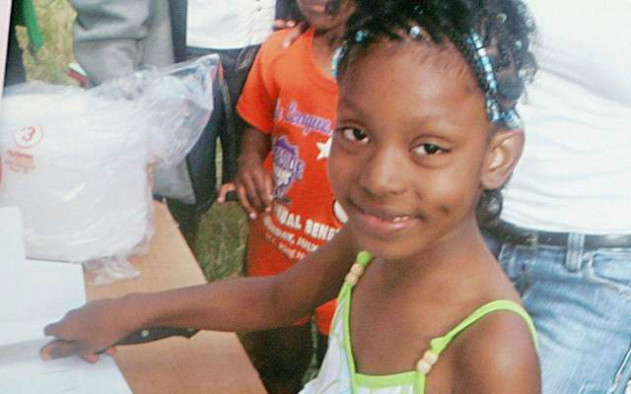Seven-year-old Aiyana Jones was killed in 2010 by Detroit police. Yesterday, a judge decided that her killer would walk free.
Yesterday, a judge moved to ensure that Aiyana Jones’ killer would never serve time for taking her life and dismissed the charge of involuntary manslaughter.
Apparently, shooting a 7-year-old sleeping on her couch is not evidence of “willfully disregarding the results to others that might follow from an act.” Breaking into a house with your finger on the trigger of a submachine gun and killing a black child does not require any will at all.
While testifying two weeks ago, Aiyana’s grandmother described how she watched her granddaughter die. Mertilla Jones sobbed, screamed, and pleaded for justice in the courtroom. She looked at Aiyana’s killer and said:
“Why you do it? Please, tell me. Why did you come in my house like that? …You know you’re wrong. You’re wrong. She was only 7 years old. She was only a baby.”
In response, the judge told the jury to look past her pain. She told them they “cannot decide this case based on sympathy.” She instructed them to ignore these “emotional outbursts.”
No sympathy. No grief. No law. No order.
I wish I could express in words what it feels to be a second-class citizen. I wish I could describe it in a way that could ensure that there would be no troll left gloating, smiling, or laughing at the plight of people with sun-kissed skin.
I want to explain what it means to be told every day, on every screen, in every book, in countless ways that your possibilities are subject to the whims of others. That your very being is subject to the whims of others.
In this country, my country, I see photos of a little dead girl killed by the men journalists deem heroes. I watch a white mother on the Today Show tearfully explain why she never wanted her black daughter. I think about Miriam Carey and Tarika Jones, Carl and Garrick Hopkins, Darius Simmons. I try to imagine their last thoughts. Did Tarika know her children survived before she died? Did she know she saved her baby? Did Miriam need help? Was she afraid?
I sometimes imagine that I might end up in chains, in rooms and cages that aim to contain my mind and spirit whenever they both give up. It seems inevitable that anyone would break under the weight of so many fucks not given, so many bodies not breathing, so many doors closed.
Atlas must have been a black girl.
Whiteness treats freedom as a zero-sum game—it locates itself in the confines and limits of blackness. “Freedom” is something you hoard, a meal you eat in a cozy restaurant while hungry people watch through windows outdoors.
And I am starving for justice.
I am wasting away for an ounce of humanity that sees black grief and suffering for what it is. I am wondering how it is possible that people can seem so human and be so inhumane at the same time. I am trying to figure out whether it’s possible to quantify all the lost lives and drowned beauty.
Nightly news anchors describe the latest health trend, report on cop funerals, store hold-ups, and car accidents, and they seldom tell me that the new mall is being built on the graves of African slaves, that the police killed another child tonight, that a black mother just lost her last son yesterday.
A little girl who fell asleep on her couch next to her grandma never woke up.
Tonight I am mourning for Aiyana. And all the other black girls, living and dying. And I am praying, like so many people have before me, that there is some power, both in this world and beyond it, that hears our cries.
Khadijah Costley White is an assistant professor in the Department of Journalism and Media Studies at Rutgers University in New Brunswick. Find her on Twitter here.
Related Links:

